
[ad_1]
How important are white evangelical Christians to Donald Trump’s political fate and to the MAGA movement he inspired?
In both the 2016 and 2020 presidential cycles nearly half of Trump’s voters were white evangelical Christians—by far the most reliable bloc of voters in his electoral coalition.
In 2016, 135.5 million voters cast ballots for president. According to exit polls, 26 percent of them—35.2 million voters—identified themselves as white evangelical or born-again Christians. Trump got 80 percent of their votes—a total of 28.2 million voters. That accounts for 45 percent of the 62.6 million votes he received.
Four years later, 158.4 million Americans voted for president. The exit polls reveal that 28 percent of them—44.4 million voters—were white evangelical/born-again Christians. Among them, 76 percent voted for Trump. That’s 33.7 million white evangelical votes for Trump—45.4 percent of his total of 74.2 million votes.
The number of white evangelical Christians in the US population is a matter of some dispute. The US Census doesn’t ask questions about Americans’ religious identities or beliefs. A 2020 survey by the Public Religion Research Institute (PRRI) found that 14 percent of Americans identify as white (non-Hispanic) evangelical Christians. A Pew Research Center survey conducted the same year put the number at 16 percent.
Whatever figure is used, the proportion of white evangelical voters is clearly much higher than their share in the whole population. White evangelicals’ turnout rates are considerably higher than other religious groups.
On a wide range of religious, political, and social beliefs, white evangelicals differ sharply from Americans in general and other religious groups, including Catholics, mainline (non-evangelical) Protestants, Jews, those without any religious identity or affiliation, and even Black and Hispanic evangelicals. These strong beliefs are reinforced by dense social ties. Half of white evangelicals attend church at least once a week.
“White evangelicals are self-isolating, because they believe that the rest of the world is evil,” explained Paul Djupe, a political scientist at Denison University in Ohio. “There’s a parallel society among evangelicals that doesn’t intersect with the rest of the world. They not only go to church together. They also go to evangelical plumbers, hair stylists, and others who provide services.“
Being a white evangelical is as much a political identity as a religious one, noted Ryan Burge, a political scientist at Eastern Illinois University. Sixty percent of white evangelicals today believe that the Republican Party is friendly toward religion, but only 8 percent think that the Democratic Party is on the side of religion.
This transformation has evolved since the 1980s, when President Ronald Reagan embraced the evangelical movement and they embraced him, led by religious and political entrepreneurs like the Rev. Jerry Falwell and the Rev. Pat Robertson. According to Burge, white evangelicals are not “reluctant Republicans” who need to be actively recruited to vote and to cast their ballots for GOP candidates. They are “thoroughly Republican.” This trend has intensified since Trump first ran for president in 2015, as white evangelicals increasingly identify with the MAGA movement and its apocalyptic views and racial resentments. This is borne out by numerous social science studies and survey data.
The MAGA world and white evangelicals are tied together by many ultraconservative beliefs, including attitudes about family and gender, that makes them outliers in American society. Black, Hispanic, and Asian evangelicals are more conservative than their non-evangelical counterparts but not as blindly right-wing or pro-Trump as white evangelicals.
More than half (56 percent) of white evangelicals, and a third (34 percent) of all Americans, say that society is better off if people make it a priority to get married and have children. Only 27 percent of white evangelicals believe that abortion should be legal in all or most cases, the position held by 65 percent of all Americans. Sixty-one percent of white evangelicals, but just 42 percent of all Americans, believe that society has become “too soft and feminine.” White evangelicals are the only religious group in which a majority (74 percent) favor banning the discussion of sexual orientation and/or gender identity in public schools.
Between 2021 and 2023, the share of QAnon believers in American society increased significantly, from 14 percent to 23 percent of all Americans. Even 14 percent of Democrats now embrace this crazy conspiracy theory, along with twice as many (29 percent) Republicans. More white evangelicals (30 percent) embrace QAnon than members of any other group. White evangelicals’ disdain for science is reflected in their views on global warming. While a significant majority (61 percent) of Americans believe that climate change is caused mostly by human activity, such as burning fossil fuels, only 31 percent of white evangelicals share that view. In fact, 19 percent of white evangelicals believe there is no solid evidence of climate change.
White evangelicals’ climate change denial plays into the lobbying efforts of the fossil fuel industry.
“The billionaire class doesn’t really care about these Christian issues,” explained Kenneth Wald, a University of Florida political scientist and coauthor of Religion and Politics in the United States. “These economic conservatives use the Christian right for their own ends. It’s an alliance of convenience.”
If so, white evangelicals have drunk the corporate Kool-Aid. Less than one-third (29 percent) of all Americans but 40 percent of white evangelicals favor cutting taxes for corporations.
Ad Policy
Not surprisingly, white evangelicals view themselves as victims in a culture war that involves religion, politics, race, education, gender roles, economics, and individual liberties. This is compounded by the reality that the number of white Christians has fallen precipitously, from 73 percent of the population in 1972 to 46 percent in 2021. They feel betrayed, and left behind by the major shifts in American society.
Trump is neither religious nor knowledgeable about theology, but he knows how to tap into white evangelicals’ fears of being persecuted and feeling embattled.
“Our country’s gone to hell. As soon as I get back in the Oval Office, I’ll also immediately end the war on Christians. I don’t know if you feel it. You have a war. There’s a war,” said Trump in a speech in Iowa in December. “Under crooked Joe Biden, Christians and Americans of faith are being persecuted and government has been weaponized against religion like never before.”
Like Trump, white evangelicals have a persecution complex. Seventy percent of white evangelicals—though only 47 percent of all Americans—believe that life has become harder in the United States for people with strong religious faith. A 2023 survey found that 60 percent of white evangelicals believe they experience a lot of discrimination—up from 42 percent in 2009. In fact, 61 percent of white evangelicals believe that discrimination against white Americans has become as big a problem as discrimination against racial minorities. During that period, meanwhile, the proportion of white evangelicals who think that gays and lesbians face significant discrimination declined from 59 percent to 39 percent.
Seventy-five percent of white evangelicals—but only 44 percent of all Americans—believe that God has granted America a special role in human history. But they believe that Democrats and liberals have violated God’s will by moving the country in the wrong direction.
According to a Pew survey, 81 percent of white evangelicals believe that the country’s founders intended for America to be a “Christian nation,” as do 60 percent of all Americans. Similarly, 81 percent of white evangelicals believe that the United States should be a Christian nation today, while just 45 percent of all Americans agree. Two-thirds (65 percent) of white evangelicals think that if the two conflict, the Bible should have more influence on American law than the will of the people. In contrast, 27 percent of Americans shared this view.
Popular
“swipe left below to view more authors”Swipe →
White evangelicals are no fans of religious diversity. A 2021 PRRI survey found that three-quarters (76 percent) of white evangelicals say that being Christian is important to being “truly American.” In fact, 57 percent of white evangelicals say they don’t want to live in a religiously diverse country. A 2023 survey discovered that nearly two-thirds (64 percent) of white evangelicals qualify as either Christian nationalists (29 percent) or sympathizers (35 percent). Three-quarters (78 percent) believe that America is in danger of losing its culture and identity.
The same goes for ethnic diversity. White evangelicals are the leading proponents of the view that “immigrants are invading our country and replacing our cultural and ethnic background.” Almost four in 10 Americans (38 percent) agree with the statement, but 61 percent of white evangelicals do. Trump, Fox News, and other right-wing media outlets have promoted this view, as did the white supremacists who organized a violent protest in Charlottesville, Virginia, in 2017. Three-quarters (74 percent) of white evangelicals and 77 percent of Republicans support installing deterrents such as walls, floating barriers in rivers, and razor wire to prevent immigrants from entering the country illegally, even if such measures endanger or kill some people. Among Americans in general, 44 percent embrace this policy. Almost four in 10 (39 percent) white evangelicals favor an immigration border policy that separates children from their parents and charges parents as criminals when they enter the country without permission. Fewer than one in four (23 percent) of Americans share this belief.
More white evangelicals express racist views than members of any other religious or demographic group.
Three-quarters (75 percent) of Americans say that there is a lot of discrimination against Black people, but only 55 percent of white evangelicals share that view. Whereas 43 percent of Americans believe that police killings of Black Americans are isolated incidents, not part of a broader pattern of police racism, 70 percent of white evangelicals think this way. Two-thirds (65 percent) of white evangelicals don’t believe that the legacy of slavery and discrimination has created unfair economic disadvantages for Black Americans. Only 41 percent of all Americans share this view. The idea of reparations is not popular among Americans, but it is particularly unpopular among white evangelicals. Only 27 percent of Americans believe that the US government should economically compensate African Americans who are the descendants of enslaved people, but even fewer—5 percent—of white evangelicals embrace that view.
Just one in five (19 percent) white evangelicals say the Republican Party has been taken over by racists, but 51 percent of all Americans agree. Among Americans in general, 57 percent believe that Trump has encouraged white supremacist groups, but only 21 percent of white evangelicals think so.
The idea that white evangelical Christians have strong loyalties to “God and guns” is borne out by social science research. According to a Pew Research Center report, 41 percent of white evangelicals own a firearm, compared with 30 percent of all Americans. White evangelicals are also more opposed to measures to limit gun sales and ownership than other Americans. Their belief in personal freedom and individual liberty—that the right to bear arms is a God-given right—and their distrust of government combine to make white evangelicals strong supporters of the gun rights movement.
Over the past two decades, the National Rifle Association has forged a close alliance with white evangelicals and white supremacists. At the 2018 Conservative Political Action Conference, Wayne LaPierre, the now-deposed head of the NRA, gave a speech claiming that the Second Amendment was not a right “bestowed by man, but granted by God to all Americans as our American birthright.” Evangelical churches have even hosted gun rights rallies.
“The problem is not guns, said Texas Governor Greg Abbott at the NRA’s 2018 annual convention. “The problem is hearts without God. It is homes without discipline and communities without values.”
At an NRA meeting in February, Trump said that “no one will lay a finger on your firearms” if he returns to the White House. He bragged that during his time as president he “did nothing” to curb guns.
“Every single Biden attack on gun owners and manufacturers will be terminated on my very first week back in office, perhaps my first day,” Trump said at the NRA’s Presidential Forum in Harrisburg, Pennsylvania.
In 2012 Benjamin Pollack opened the Rapture Guns and Knives story in North Lakeland, Florida, to serve “your gun and knife needs til Jesus comes.” Its Facebook page describes it as a “Christian owned Gun and Knife store” and its motto is “Walking by faith with steel in our hands.” Three of the store’s employees—son Johnny Pollack, daughter Olivia Pollack, and Joseph Hutchinson—were indicted for participating in the January 6, 2021, insurrection at the Capitol in Washington, DC, including for assaulting law enforcement officers. “Our country is being taken away from us,” said Benjamin Pollack, a strong Trump supporter. “And if we don’t do something about it, it’ll be gone.”
White evangelicals share Trump’s sense of being persecuted, so it isn’t surprising that many of them embrace his views about the previous election and his support for insurrection.
A 2021 PRRI survey found that 60 percent of white evangelicals—along with just 31 percent of all Americans and 6 percent of Democrats, but 68 percent of Republicans—believe that the 2020 presidential election was stolen from Trump.
Even more ominous, today almost a quarter of Americans (23 percent) agree that “because things have gotten so far off track, true American patriots may have to resort to violence in order to save our country”—an increase from 15 percent in 2021. Among white evangelicals, 31 percent share that view—more than any other religious or demographic group. Support for violence is even higher among white evangelicals who believe the election was stolen. That attitude bore fruit during the January 6, 2021, insurrection at the Capital.
In this year’s election, Trump is counting on a large turnout of white evangelicals, particularly in battleground states. But the Republicans’ long-term reliance on this group is based on a serious flaw. The number of white evangelical Christians is shrinking, particularly among young people. This is part of a larger trend reflected in the rise in the number of Americans claiming no religious identity or affiliation from 16 percent to 27 percent since 2007. Meanwhile, the proportion of white evangelicals in the population has steadily declined, from 23 percent to 13.6 percent, according to PRRI. Among all religious groups, white evangelicals have the largest proportion over 50 and the fewest adherents under 30.
“The problem the Republican Party has is that it is the party of white Christianity,” said political scientist Ryan Burge, “and that group is declining every day.”
Thank you for reading The Nation!
We hope you enjoyed the story you just read. It’s just one of many examples of incisive, deeply-reported journalism we publish—journalism that shifts the needle on important issues, uncovers malfeasance and corruption, and uplifts voices and perspectives that often go unheard in mainstream media. For nearly 160 years, The Nation has spoken truth to power and shone a light on issues that would otherwise be swept under the rug.
In a critical election year as well as a time of media austerity, independent journalism needs your continued support. The best way to do this is with a recurring donation. This month, we are asking readers like you who value truth and democracy to step up and support The Nation with a monthly contribution. We call these monthly donors Sustainers, a small but mighty group of supporters who ensure our team of writers, editors, and fact-checkers have the resources they need to report on breaking news, investigative feature stories that often take weeks or months to report, and much more.
There’s a lot to talk about in the coming months, from the presidential election and Supreme Court battles to the fight for bodily autonomy. We’ll cover all these issues and more, but this is only made possible with support from sustaining donors. Donate today—any amount you can spare each month is appreciated, even just the price of a cup of coffee.
The Nation does not bow to the interests of a corporate owner or advertisers—we answer only to readers like you who make our work possible. Set up a recurring donation today and ensure we can continue to hold the powerful accountable.
Thank you for your generosity.
Peter Dreier
Peter Dreier teaches politics at Occidental College and is author of several books including Baseball Rebels: The Players, People, and Social Movements That Shook Up the Game and Changed America, published in April, 2022.
More from The Nation
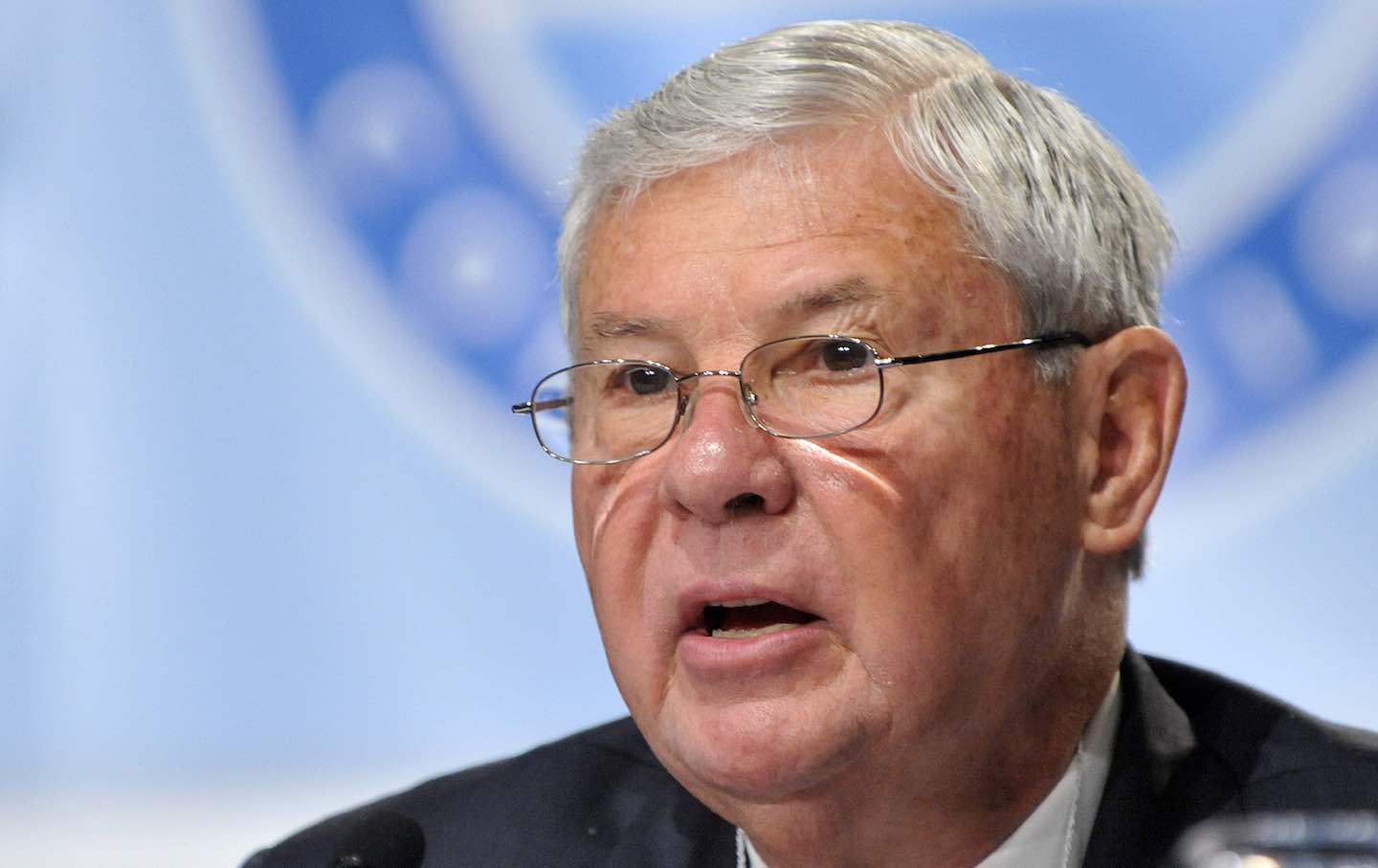
The former Senate Intelligence Committee chair saw through Republican efforts to manipulate Congress into authorizing a war that should never have been fought.
John Nichols
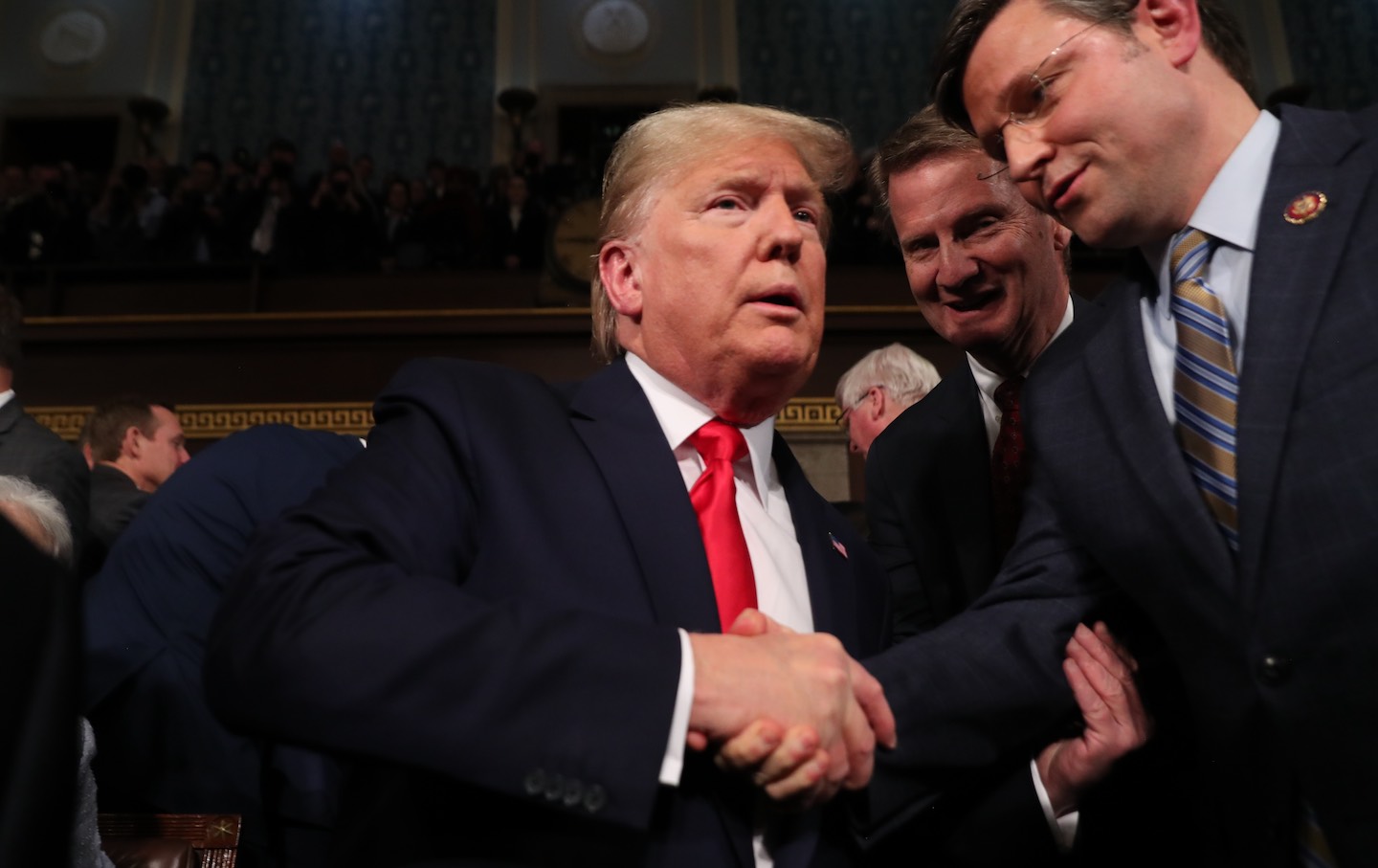
The vote to reauthorize section 702 of the Foreign Intelligence Surveillance Act rose and fell and rose again on the whims of one Donald J. Trump.
Chris Lehmann
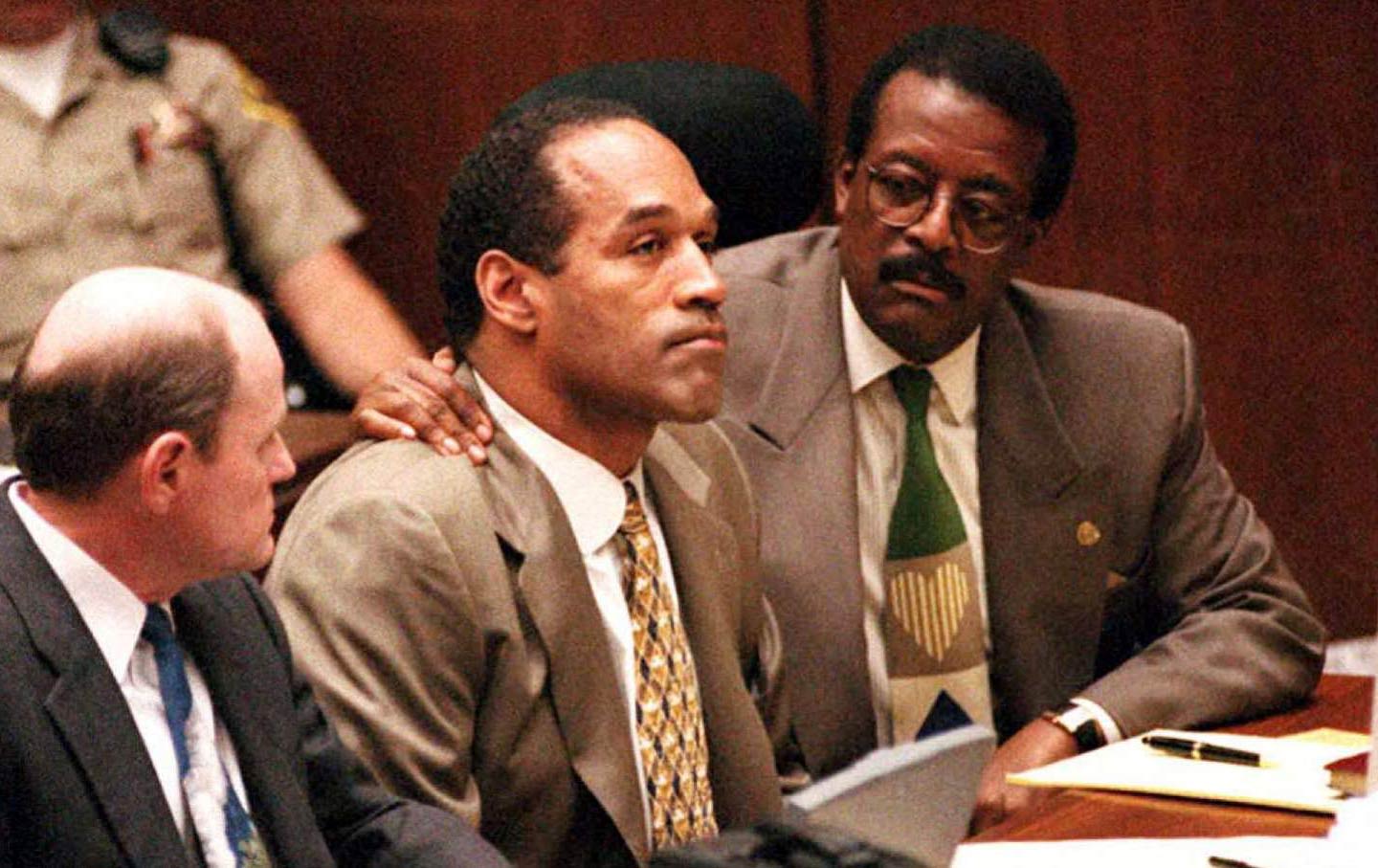
Society / April 15, 2024 Donald Trump’s Christian Soldiers Most people saw the Hall of Fame running back not as a person but as symbol for what was wrong with the country. Dave…
Dave Zirin
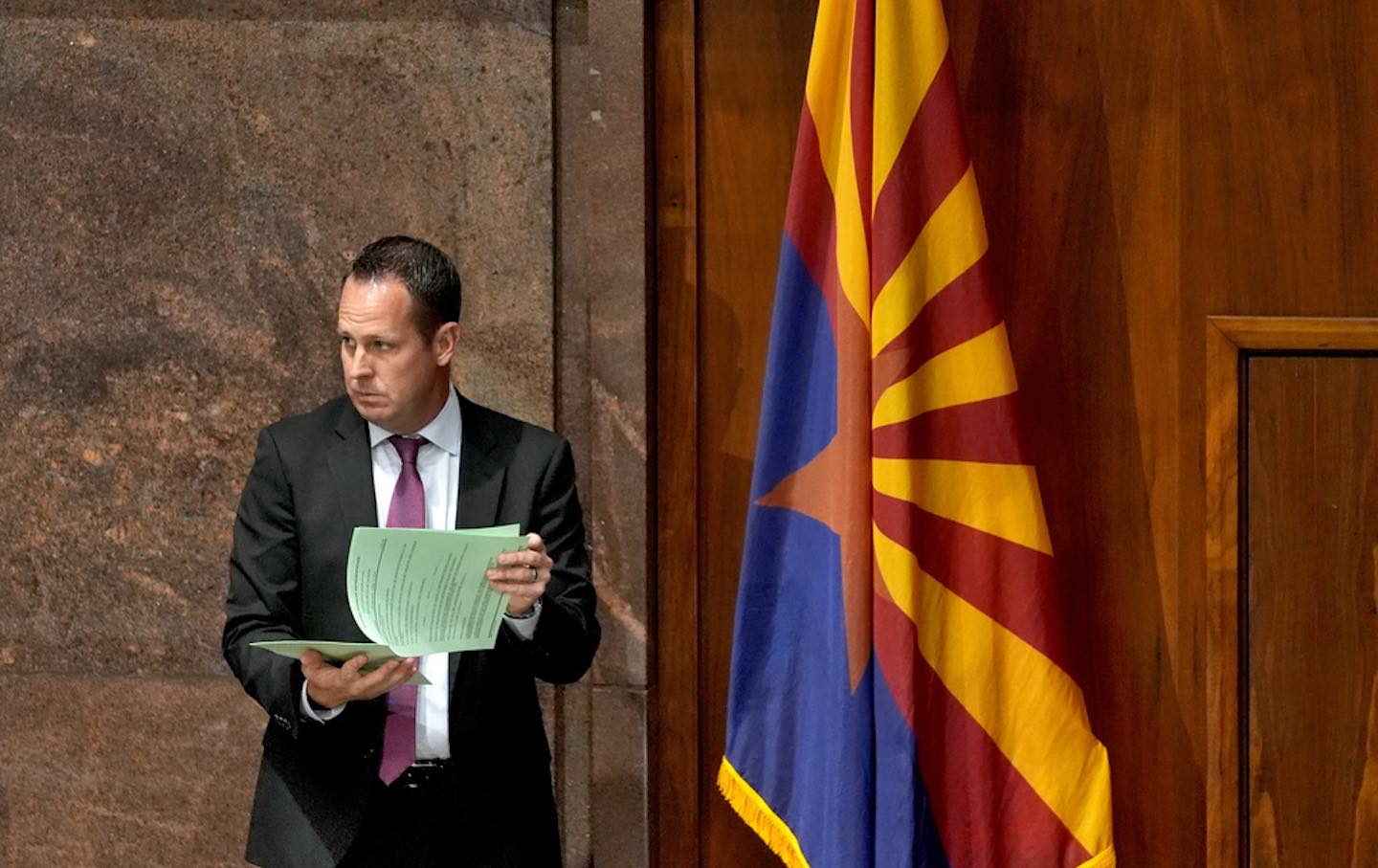
Arizona’s Supreme Court ruling reinstating a draconian abortion ban puts Republicans at odds with the American public.
Left Coast
/
Sasha Abramsky
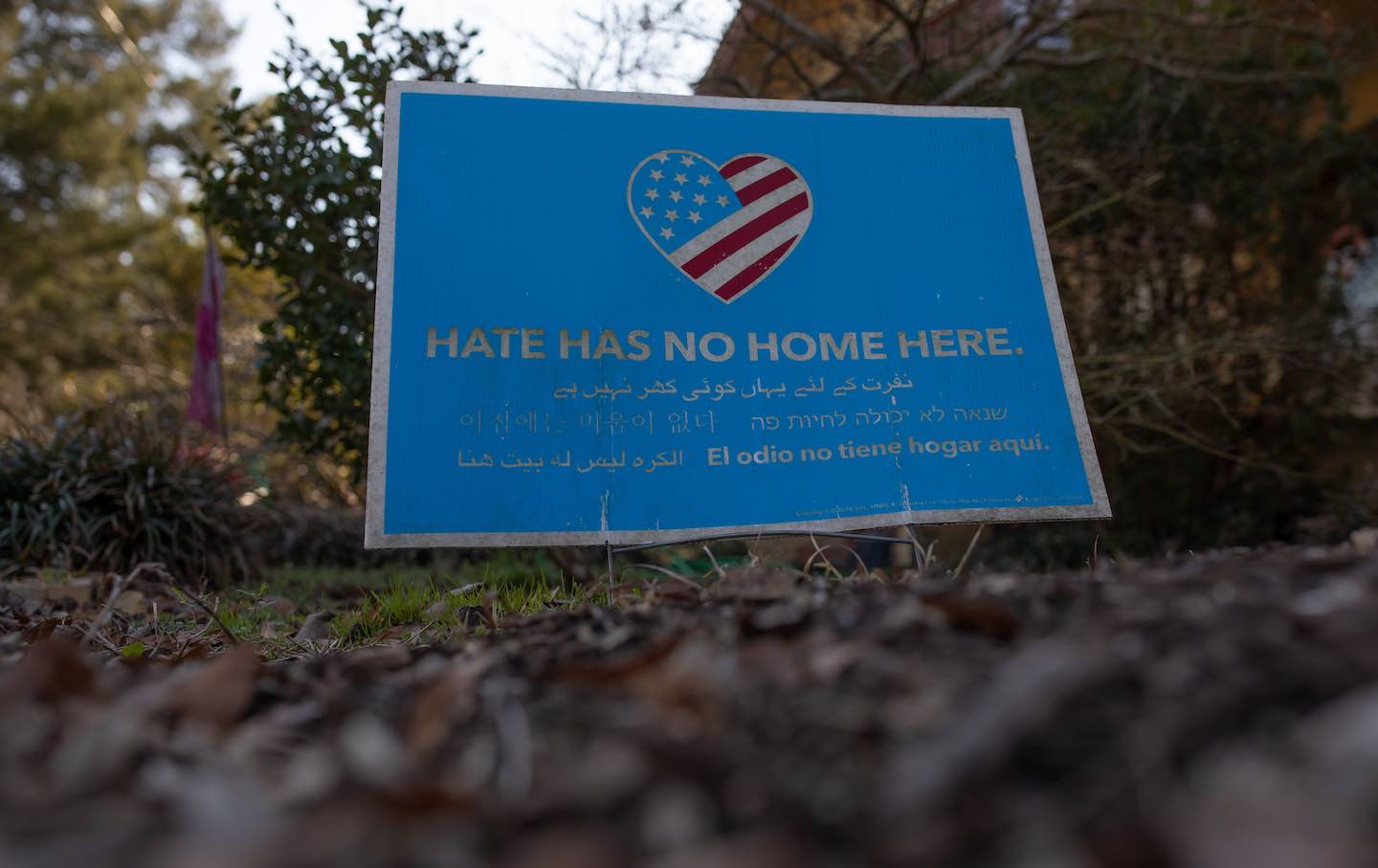
Only a strong economic message can restore the party’s credibility with the working class.
Isaac Rabbani
[ad_2]